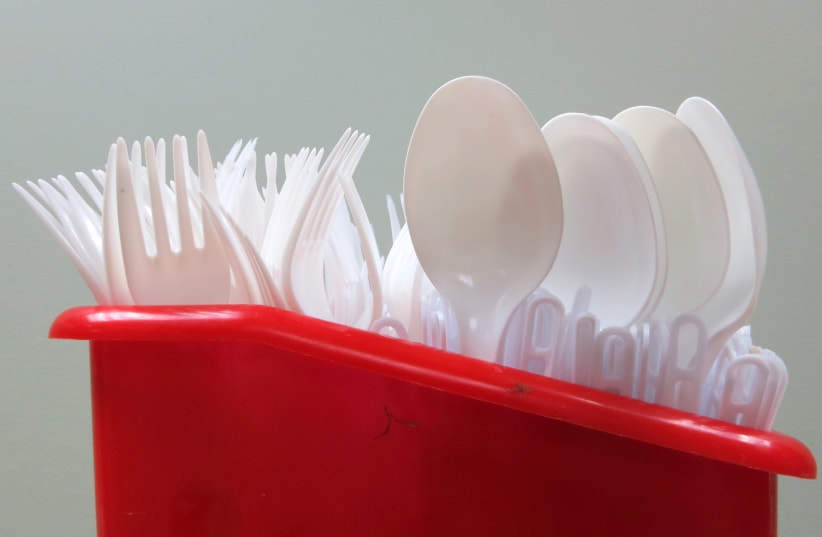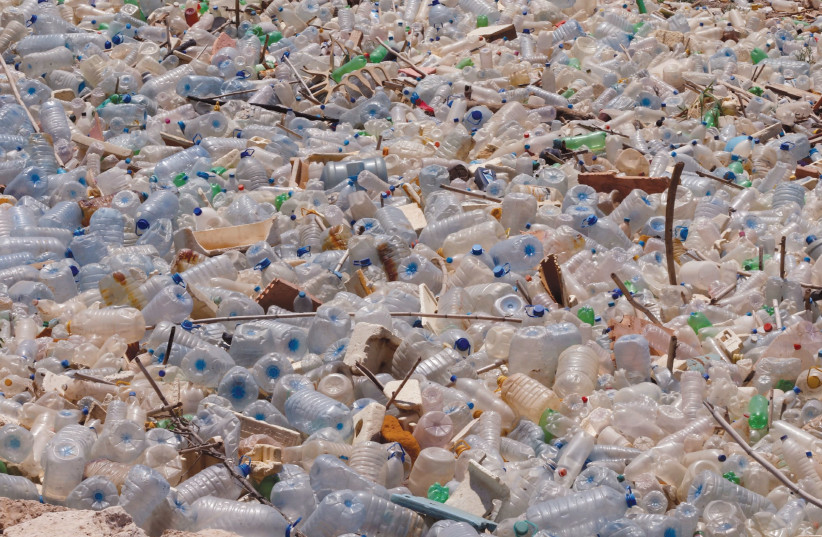At the end of November, the government put into effect a new tax that would significantly increase the production and import cost of disposable plastics, “with the aim of doubling the final price to the consumer and thus reducing the consumption of these polluting products,” according to the Environmental Protection Ministry. Now, two weeks later, the effects of that tax are beginning to show.
This tax has far-reaching implications, affecting businesses, manufacturers and individuals purchasing single-use plastics. As a result of the steep increase in production/import cost, it will theoretically also make a positive impact on the environment as a result of fewer purchases. “The tax will lead to a change of behavior among consumers and reduce garbage in the public sphere,” said Environmental Protection Minister MK Tamar Zandberg.
Despite the high hopes of the ministry, manufacturers are understandably discontent.
“We believe that the way that this was implemented is a little bit lacking,” says Libby Gavri, head of Innovation and Sustainability at Madaf Plazit Packaging (MPP). “We believe that the true solution is in recycling and reusing in a circular economy, which is what we’ve been trying to push for the last year at least.”
Gavri pointed out that for the past six months her company has been promoting a pilot project in select locations, including a large hospital, which aims to create that “circular economy.” This lends weight to her claim that MPP is in agreement with the core cause behind the tax’s implementation. “We’re not against it,” she said. “In general, we believe that it’s true that we should minimize or at least decrease the usage of single-use plastics – when it’s applicable, and when it’s appropriate.”
Gavri explained why MPP’s product is a necessity: “Today, in a hot country like this, with coronavirus and health issues, it’s not really possible to have customers drink from other kinds of cups,” she said. “They need to have something that is single-use,” citing as an example the impossibility of being served with glass dishware at a hospital cafeteria. “It’s not practical – I don’t think anyone wants that.”
Gavri’s statement on the importance of circular economy was echoed by another in the industry.
“From our point of view, as a union in which hundreds of industrial companies are members, we have seen an increasing trend toward a transition in manufacturing and developing sustainable products based on environmentally friendly technologies and materials,” said Oren Harambam, director of the Association of Consumer Goods and Construction Products Industries. “The association leads the plastics industry in Israel for the development and production of disposable utensils, packaging, and other innovative and more environmentally friendly products, in accordance with the dramatic changes that the global industry is undergoing.”
Gavri said she doubted that it would achieve the goal of reduced consumption.
“I think that taxation without promoting education – without finding alternatives and putting the tax money back into the economy to find solutions – I don’t think that taxation in and of itself will do the job in the long run.”
While the manufacturing industry’s dissatisfaction with the tax’s implementation is to be expected, it is perhaps surprising that the more environmentally dedicated are unimpressed as well.
“This is a step in the right direction, but it is not done properly and is not enough in the context of the war on plastic waste,” said Meital Peleg Mizrachi, a Consumption and Environmental Justice researcher in the Department of Public Policy at Tel Aviv University.
“In general, environmental regulation, in the spirit of ‘polluter pays’ – which embodies the environmental cost in the price of products – is a positive regulation,” said Peleg Mizrahi. “This is especially true in Israel, where waste rates are among the highest in Western countries. However, in the case of disposable plastic, proper and good regulation is legislation that prohibits the use of disposable plastic and does not dissolve its use. Taxation on disposable plastic is portrayed as taxation that harms the weaker sections and allows those with economic capabilities to continue to pollute unhindered.”
The manager of a popular coffee shop chain said that the effect of the tax isn’t felt by the individual branches of the chain – it’s a higher-up issue.
Meanwhile, independently owned shops are feeling trapped between a rock and a hard place.
“In general, we only work in takeaway,” said Elinor Haifler, an independent coffee shop owner in Karkur. Over the past two years, she has been required due to restrictions brought on by coronavirus to remove her indoor seating space, and is thus limited exclusively to takeaway service. Now she is being taxed for that more harshly.
“It’s a problem,” said Haifler. “Before coronavirus, we had seating. Because of coronavirus, we had to close it down. That means that anyone who comes can only get takeaway, because there’s nowhere to sit here. I understand that it’s to combat the global [climate] issue, that’s good, I understand.”
Despite the tax’s good intentions, however, “it’s not making people purchase any less.”


